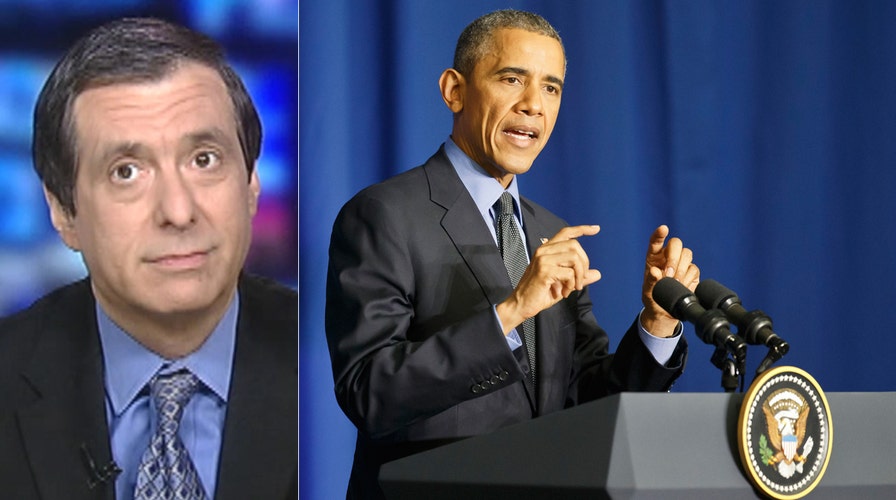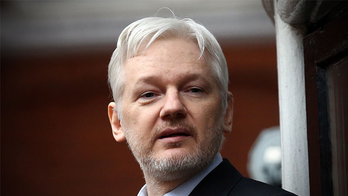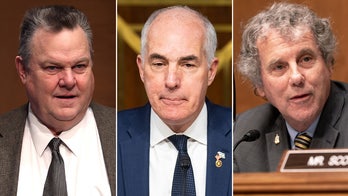Kurtz: What happened to Obama the orator?
'Media Buzz' host reacts to Washington Post op-ed lamenting President Obama's lost voice
President Obama cares deeply about climate change, so when he held a news conference yesterday from the global summit in Paris, I made sure to watch.
“Climate change is a massive problem," Obama said. "It is a generational problem. It's a problem that by definition is just about the hardest thing for a political system to absorb, because the effects are gradual, they're diffused. And yet despite all that... I'm optimistic. I think we're going to solve it.”
The president has been getting hammered by Republicans over an issue that many of them scoff at. Chris Christie said it was insulting that Obama even attended the conference. Donald Trump called Obama’s declaration that global warming is our No. 1 problem “one of the dumbest statements I’ve ever heard in politics.”
My point here isn’t about whether Obama should or shouldn’t be pursuing a climate agreement when polls show that isn’t near the top of voter concerns right now. It’s about how he sounded.
And that is, he sounded like he usually does, unleashing great torrents of words. He is thoughtful and crafts his responses slowly and carefully. And yet, increasingly, the words don’t break through. Seven years into his presidency—seven years of speeches, pressers, interviews, podcasts, skits, debates, conventions—we are accustomed to the sound of his voice, but almost all those words lack a sense of urgency.
A piece by the Washington Post’s veteran liberal columnist Richard Cohen captures the disillusionment on the left with the man who was once a racial groundbreaker and hope-and-change figure. Obama is still capable of seizing the moment, as he did with his soaring “Amazing Grace” eulogy for the Charleston church shooting victims. But that rarely happens any more.
Perhaps some of this can be chalked up to second-term blues. George W. Bush never seemed to me to have the same hold on the country’s attention after Katrina, which came as the Iraq war was turning into a quagmire. Bill Clinton was basically in caretaker mode after being acquitted at his impeachment trial. Ronald Reagan was never quite the same after the Iran-contra scandal. And then there was that Watergate thing.
But Obama’s entire second term has been marked by an inability to make progress on his legislative priorities, from gun control to immigration, and by rising chaos in the Middle East—capped by the unnerving bloodshed in Paris.
The president appeared passive and defensive after ISIS terrorists killed 130 people in France. White House correspondents kept peppering with him with the same questions in Turkey—Hadn’t he underestimated ISIS? Wasn’t his strategy failing?—because his answers were so unsatisfying. Obama did insist in subsequent appearances that he understands that many Americans are fearful that this country could be hit next.
Now comes Cohen with what feels like a final verdict on Obama, writing that “his eloquence has been replaced by petulance and he has lost the power to persuade.” And then he ramps up:
“The president has lost his voice...It’s not that Obama has lost his gift of eloquence. His problem is that he often has nothing to say.”
Zeroing in on Paris, Cohen writes: “Unlike many other mass killings, this one was broadcast in real time — unfolding on TV as it happened. It left the United States both shaken and horrified. Yet Obama spoke coldly, by rote — saying all the right things in the manner of a minister presiding at the funeral of a perfect stranger.”
Part of this scathing piece is that Cohen disapproves of Obama’s lack of aggressiveness in the Mideast, insisting “he's been bullied off the playground.” But his ultimate point is rhetorical:
“To a large degree, Obama became president on the strength of his eloquence. To a large degree, that is what has deserted him. He is out of words because he is out of ideas.”
That’s a harsh judgment. A president is never totally a lame duck, as Paris reminded us. But at this point in the cycle, the debate moves on to the politicians who want to succeed him. The incumbent’s ideas matter less because Congress, barring a financial meltdown, never does much of anything in an election year.
Even when he was riding high, Obama had a tendency to sound like a long-winded law professor. Many may have seen his no-drama demeanor as an antidote to Bush’s “dead or alive” swagger. But if every president’s election is in part a reaction to the last one, Obama’s successor may well wield fewer words and more passion.





